- Home
- Patrick Robinson
U.S.S. Seawolf am-4 Page 38
U.S.S. Seawolf am-4 Read online
Page 38
0300. Monday, July 17.
Office of the Southern Fleet Commander. Zhanjiang.
In the mind of Admiral Zhang Yushu, all was lost in this ill-fated adventure. The American submarine was gone, indeed the entire Canton dockyard was almost gone.
And now it was obvious to him that the forces of the United States had landed on Xiachuan and taken the jail. There would be, he knew, many, many casualties, and much worse, no prisoners.
So far as he knew, only two of the Americans had actually died. And they were the only two Americans who were safe, so far as he could tell. The rest of them, if they escaped, which they now seemed certain to do, would sing out to the whole world what had befallen them after their ship had been essentially hijacked in international waters.
It was not, and had never been, the policy of the regime of Communist China to give a damn what the rest of the world thought. But increasingly, in the interest of international trade, they had tried to be at least agreeable to world opinion.
This looked to Zhang like trouble on a grand scale. In fact, this could turn out to be Tiananmen Square in the jungle. For the first time in his entire life, Zhang Yushu thought his career might be on the line here.
He was simply uncertain whether any C-in-C in any part of the People’s Liberation Army/Navy could afford to be the only person responsible for a disaster of this magnitude: nuclear catastrophe, many Chinese deaths; failure to incarcerate prisoners, many more Chinese deaths; loss of two massively expensive helicopters to foreign enemy on Chinese soil; loss of a highly expensive guided missile patrol boat in Chinese waters, on a Chinese jetty, to the same foreign enemy; and worldwide public condemnation of Chinese methods of interrogation of a most important friendly trading partner.
And only one solitary person to blame: Admiral Zhang Yushu himself, architect of the entire, hideous comedy of errors.
Admiral Zu stood up and walked across the room, wearing a deep frown.
“Is there any point speculating that the Americans may not actually have attacked our island, and that we are just experiencing some kind of major power cut?”
“None. No power cut would affect the radio or the satellites. The reason we are unable to contact Xiachuan is because the Americans have attacked it. There is no other explanation. And I know them so well.”
“But how?”
“We’ve seen no large helicopter platform within two hundred miles of the coast. Therefore, they can’t be using helicopters. So they must be using ships. And only submarines could get close enough without our seeing them. And then small landing boats to bring them to shore.”
“But they cannot overpower our forces. We have more than one hundred fully armed guards and many other personnel.”
“Well, we may have beaten them, driven them off. But somehow there’s been a battle. That’s why we cannot make contact with the island. What worries me is the coincidence with the submarine’s demise. Just a few hours ago, we lose the ship, and now the island is completely inaccessible.”
“Well, what do we do? Send in reinforcements? Helicopters? Troops? Artillery?”
“No, Jicai. It’s much too late for that. It would take us two hours to prepare at this time of night, and another hour to get there. No, our only chance is by sea, because if the Americans are there, they came in submarines. And if they came to rescue the prisoners, they will have to leave in submarines. They could not have used surface ships or we would have seen them long ago.
“Jicai, this is a Navy problem. If we want to catch and punish the Americans, it will be on the sea. If we can catch them in Chinese waters, we are at liberty to attack in self-defense. We may even have the chance to put a couple of American nuclear boats on the bottom of the ocean.”
Admiral Zu looked across the room at the now-distraught Commander-in-Chief as he strode back and forth, reflecting on this local but Homeric struggle between two of the world’s great powers.
“But how, with what?”
“Jicai, if they are about to evacuate Xiachuan, they are almost certainly on the surface or in shallow water. Our destroyer, when it gets there, could attack very effectively.”
“Well, sir, let’s look at the charts. Right here is Xiachuan. If the Americans came in underwater, they would be around here, where it’s forty meters deep. Plainly we cannot get ships out of Canton at the moment, since the entire waterfront is radioactive…so whatever ships we send to intercept will have to come from here…four hours away.”
“What ships do we have available, Jicai? The big new destroyer for a start, eh? Xiangtan. It carries guns, torpedoes, surface-to-surface missiles and two ASW helicopters. Also, she makes over thirty knots through the water, and she has reasonable sonar.”
“Yessir. And the light Jianghu-class frigate Shantou is ready to sail immediately.”
“She carries A/S mortars and depth charges, correct?”
“Absolutely, sir.”
“Then I think we must proceed, Jicai. Send for both commanding officers. I think we should explain to them personally precisely what we expect of them. We could, with good reason, hit an American submarine.”
“Good reason?”
“Certainly, a big American nuclear boat in Chinese territorial waters, an island that had been attacked by an obviously American force from the submarine…oh yes, Jicai…we could make that sound very plausible. We could even claim hot pursuit, continuing to chase them in international waters and demanding their legal arrest.”
“I am just not sure where any of this is taking us, Yushu. Let’s face it, if the Americans have their prisoners back, why not just let them go? They’re going anyway, and Seawolf is lost.”
“That has to do with loss of face, Jicai. I agree that the prisoners are probably going home. Mostly. And I understand that they will talk about us and our methods of interrogation. But I would prefer that not all of them went home. I would just feel better if we were able to sink an American submarine, which would take a few dozen of the prisoners down with her…that would be more satisfactory to me. I would feel that I had not been completely humiliated. And in the halls of power in Beijing, that might look much better for me. I might even retain my job.”
“Yushu, in all the years I have known you, I have never heard you speak like that before, considering yourself above the principal military picture.”
“Jicai, I have never had to. Now it’s different.”
“And what of the warships now on their way? What will I order them to carry out?…”
“Jicai, you will tell them to sink any American submarine, no matter what the risk, no matter how difficult. As many as they find.”
Just then, Admiral Zu’s young lieutenant assistant came in, carrying a single sheet of paper. “Just in from Canton city, sir…a very short signal. Telephone communication from a village elder on the island of Shangchuan, just across the bay from the jail. He says his sons sighted a very bright glow in the sky about an hour ago, says it looked like a very large fire…he telephoned the police in Macao, and they networked it through their headquarters in Canton.”
“Thank you, Lieutenant. That will come as no surprise to our learned Commander-in-Chief.”
Admiral Zhang continued to pace the room. “We must get one of them, Jicai. We must hit one, and put a lot of Americans on the bottom of the ocean. It is essential that we do that.”
“Just for loss of face and your career, Yushu? Do you not think there may have been enough bloodshed already?”
Admiral Zhang hesitated. And then he unloaded on his oldest friend, control slipping away as he spoke. “SILENCE!” he roared. “SILENCE, Jicai. I must have revenge, do you understand me? REVENGE! For God’s sake, am I not entitled to that, after all I have done for this country? I understand I may be relieved of command, but don’t deny me my pride. If I go, I must go as a warrior, as a commander who fought the enemy to his last breath. Not as a poor, pathetic creature, beaten and humbled by the American imperialists, pounded into defeat and th
en sent away to rot in obscurity.
“Don’t begrudge me my pride, Jicai. I must save face. And the only way to do that is to make sure we hit the Americans. If I could, I’d do it myself. Nothing would make me happier than to smash a Chinese torpedo right into the heart of an American ship — I hate them, Jicai. My God, I hate them.”
For the first time, Admiral Zu was actually quite concerned about the state of mind of the Commander-in-Chief of the People’s Liberation Navy. His own instinct was to let the damned American prisoners go, clear up the mess, apologize to Washington for the destruction of Seawolf in the accident in Canton, blame the damage on the collision with the destroyer, and get on with life, trade and prosperity.
Yushu’s pride, he thought, might prove expensive.
1415 (local). Sunday, July 16.
Office of Admiral Morgan.
The White House.
The hotline from the Oval Office rang yet again.
“Hello, sir,” said Arnold Morgan. “Sorry, no word yet. But no news is good news…there was never going to be communication until the prisoners reached the first submarine, unless there was a crisis. So far there has been no communication, and they have been on the island for two and a half hours. That means the jail is in American hands, sir. Trust me. Otherwise we’d have heard.”
“But are the prisoners alive? That’s all I want to know…”
“If they’d found anything untoward, they’d have let us know by now. Sir, we have to continue to think the operation has been successfully carried out, and I’m not moving from this chair until we hear. I’ll call you the first second I get any news whatsoever.”
“Okay, Arnie. I know I’m being neurotic. But I don’t know what I’d do if I lost him…”
The admiral put the phone down and picked up his direct line to Admiral Mulligan’s office in the Pentagon. “Hi, Joe, anything yet?”
“Uh-uh. Just heard from George Morris, though. We got a picture from the overheads showing a large fire on the island of Xiachuan. Lotta black smoke, looks like fuel.”
“The fire’s probably a good sign. It should mean they’re in and attacking. Let’s face it, Joe, no one can deal with the SEALs when they’re in full cry.”
“That’s where my money is…I’ll call you back as soon as I get anything.”
0312.
The Jail. Xiachuan Dao.
Captain Crocker went over the crew list one final time. Only Cy Rothstein and Skip Laxton were still missing. Rick Hunter said, “I gotta brief your guys.”
“I got eight fast inflatables on the beach,” rapped the SEAL leader. “Each boat takes eight with one on a stretcher, nine without. I’m takin’ three boats with nine guys, that’s twenty-seven. With five stretcher cases, we got forty more places in the first wave…that’s a total of sixty-seven I want ready to leave right away. Do eggzackly what my guys say. They say DROP, you drop. They say JUMP, don’t stop to ask how high. You jump.
“They’ll carry the stretchers, guide you down to the beach. There’s a team there to get y’all aboard. Then you got a thirty-minute ride to a submarine. GO, TEAM.”
Judd Crocker added, “Shawn, do the head count. Andy, take care of Brad. He’s on a stretcher for the ride.”
Rick checked the courtyard for American guns or equipment that might have been dropped in the general melee. Dan Conway and Buster Townsend led the orderly stampede down the half mile to the beach where Lieutenant Commander Bennett awaited them, still covered in mud, blood and gunpowder. With his face blackened and his “drive-on rag” spattered red, he looked like Crazy Horse’s half-brother after Little Bighorn.
The night was still hot, but, as if on cue, it began to rain again, and it was slanting, tropical monsoon rain that lashed down on them, refilling the long puddles in the courtyard and soaking the winding column of men that had formed behind the lead SEALs.
Dan and Buster led them to the north for a very slow 400 yards along a rough path hacked out of the undergrowth by Olaf’s men an hour earlier, as soon as the jail had fallen into American hands. But the jungle was lower here as the land fell away toward the sea, and there was a lot of overhang, wet branches and undergrowth. The rain was belting down so hard it was forming small lakes instantly along the little track, and the SEALs up front, carrying the five stretchers right behind Buster, were slipping and sliding and cursing in the pitch dark.
Progress was painfully slow. It took 10 minutes to cover that first quarter mile, and nothing much improved when Dan changed course, now heading northeast. The terrain was, if anything, worse as the jungle thinned out above this particular stretch of beach. There were deep puddles and areas that were almost a quagmire, and they were unavoidable because nobody could see them until they were in them, up to their ankles in mud. It was very tough for the stretcher-bearers to keep their balance, and sometimes they didn’t. But no one capsized and 17 minutes after they had left the jail, the long column of Americans reached the beach.
“Christ, we thought you’d never get here,” said Lieutenant Commander Bennett, walking up to meet them. “Better hurry before the boats fill up with rainwater and sink.”
Dan Conway chuckled and followed the SEAL beach boss down to the water where the Zodiacs were moored on the sand, with their bows facing the short surf rolling in from the east. The little waves caused each boat to rise very slightly with the tide, but only the first three feet of the Zodiacs was in the water.
“Okay, guys,” called Rusty. “Let’s get one stretcher in each of the first five boats, and while we’re doing that, Buster, count out the next twenty-seven men and have them report to the last three inflatables in the line. I got two guys on each boat, the driver and one other to help with the launch…only the drivers go.”
Since everyone on the beach was in the Navy, it was a well-disciplined operation. Only the stretchers were difficult, but the SEALs had done it before, and they laid each one flat on the temporary decking they had fitted to the frame before last night’s launch. They centered the stretchers forward, which would allow other passengers to sit or kneel in a line facing aft, holding on to the handles if the sea got up.
It was complicated, but by the time Rusty had the operation halfway complete, the three boats at the far end were loaded and ready. Lt. Commander Linus Clarke was in one of them.
Rusty sent them ahead. This was no time to hang around. It was already 0335 and it would be light in less than three hours, and that was really bad news, because if the Chinese wanted to wipe them out, they could bomb and strafe this beach with absolute impunity as soon as their helicopter pilots could see the evacuation taking place.
He walked down to the end Zodiac, which was now floating 30 feet out from the beach, its painter held by a SEAL standing up to his chest in the water. And he called out through the rain, “Okay, guys, start the engines and head on out…southeast for three miles, then sou’-sou’west, course two-zero-two for six…you gottit all on the GPS tracks…just remember what I told you…when you’ve been running at twenty knots for nine miles — nearly half an hour—Hartford lies right at that point…you’ll pick up her beacon…that’s all…GO NOW…and don’t fuck it up.”
All the SEALs loved the last phrase. It was a Rusty Bennett trademark, and since they all hero-worshiped the iron-souled lieutenant commander from the coast of Maine, each driver felt that it was a personal goodwill message to him alone. Which is, in a sense, what real leadership is all about.
Back on the beach, the remaining personnel heard the big powerful engines on the Zodiacs growl into life. And they heard the long straining beat of the motors as they fought to lift their heavy loads up onto the “stump” of the wash. Then they heard the acceleration as the inflatables found their high-speed trim and literally flew over the calm water, all three together, racing beam on beam, bearing the President’s son and 26 other crewmen to safety.
When the next two boats, carrying stretchers, were ready in the water, held by SEALs, Rusty ordered them to leave. That way
he had three out in front, two a couple of miles back on the same course, and there would be a group of three Zodiacs bringing up the rear. No one would be far from help if anything went wrong mechanically. Which it had better not, otherwise the engineers, who had meticulously prepared the Zodiac outboards, would probably end up on the wrong end of the modern-day equivalent of a thousand lashes. At least that’s what Lieutenant Commander Bennett told them would happen.
And now, as the last of the engines died away in the rainswept distance of the South China Sea, there was little more they could do but wait for an hour for the boats to return. The next time, the eight boats would take 72 more off, but by then it would be 0445. And there would still be 30 men on the beach, with no hope of escape before 0555, a few minutes before dawn. And then they would be running south for almost a half hour in gathering daylight.
“This,” muttered Rusty Bennett, “is going to be tight. Fucking tight. ’Specially as me, Rick and Ray Schaeffer will be in the last boat to leave.”
But the new column was arriving now, more than 100 men walking slowly toward the beach in the dark and rain, the SEALs, weapons at the ready, marching to the side, watching the jungle edges, even though they knew there could not be any more Chinese guards on the loose. Not unless there was a parachute drop they didn’t know about. Nonetheless, a stranger would have thought the crew of the late USS Seawolf was under close arrest, rather than U.S. Navy protection.
By the time everyone was on the beach, almost 20 minutes had passed since the last Zodiac had left. The jail was now deserted, and would remain so until the gassed personnel in the dormitory began to recover in the small hours of tomorrow morning.
Judd Crocker was still on the island, and would leave in the last boat carrying his crew members, sometime in the next 45 minutes. Like the final dozen men in the first eight-boat flotilla, Judd would be transferred to the USS Cheyenne, which now waited on the surface only six miles off the southern beaches of Xiachuan, in less than 100 feet of water.

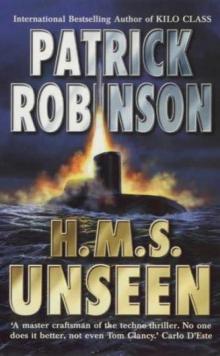 H.M.S. Unseen am-3
H.M.S. Unseen am-3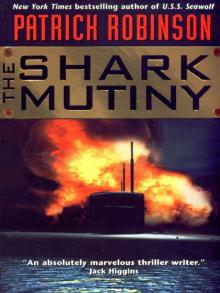 The Shark Mutiny (2001)
The Shark Mutiny (2001)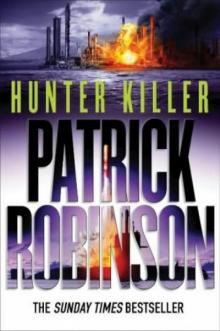 Hunter Killer am-8
Hunter Killer am-8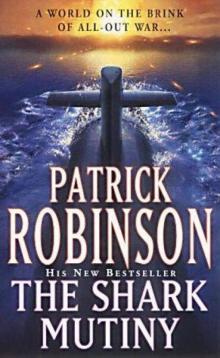 The Shark Mutiny am-5
The Shark Mutiny am-5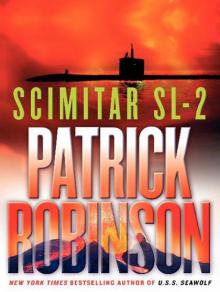 Scimitar SL-2
Scimitar SL-2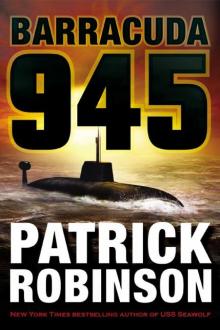 Barracuda 945 am-6
Barracuda 945 am-6 Hunter Killer
Hunter Killer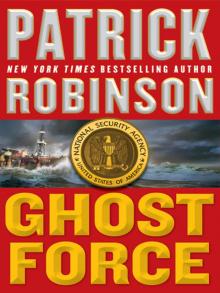 Ghost Force
Ghost Force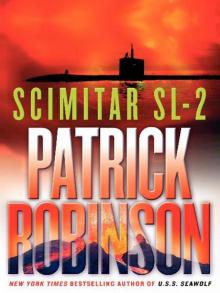 Scimitar SL-2 (2004)
Scimitar SL-2 (2004)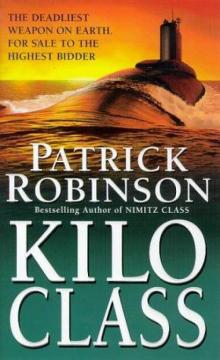 Kilo Class am-2
Kilo Class am-2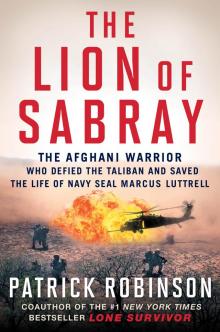 The Lion of Sabray
The Lion of Sabray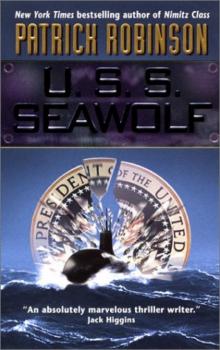 U.S.S. Seawolf am-4
U.S.S. Seawolf am-4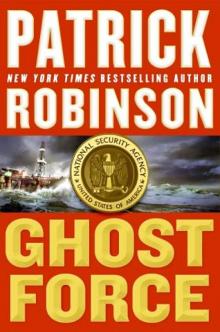 Ghost Force am-9
Ghost Force am-9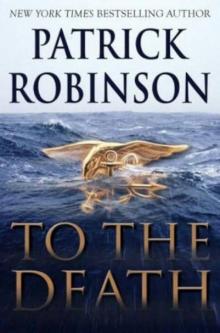 To the Death am-10
To the Death am-10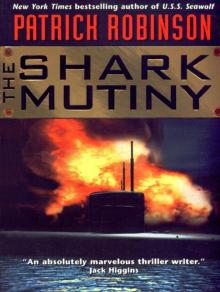 The Shark Mutiny
The Shark Mutiny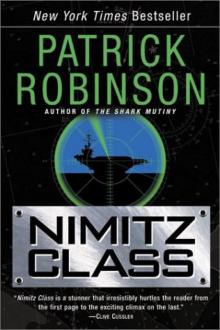 Nimitz Class am-1
Nimitz Class am-1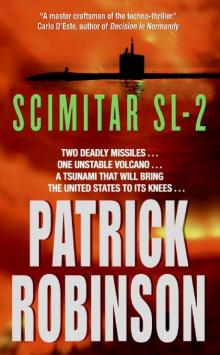 Scimitar SL-2 am-7
Scimitar SL-2 am-7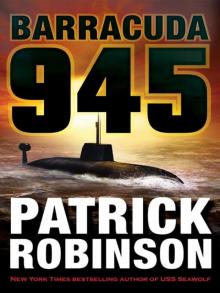 Barracuda 945
Barracuda 945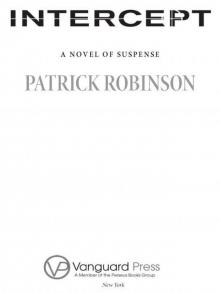 Intercept
Intercept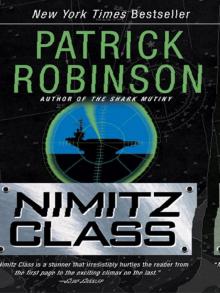 Nimitz Class (1997)
Nimitz Class (1997)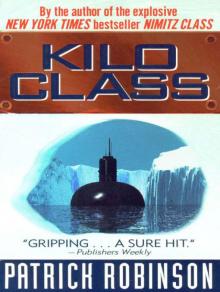 Kilo Class
Kilo Class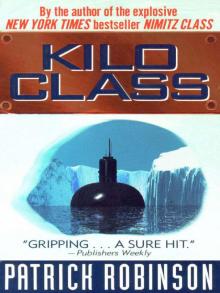 Kilo Class (1998)
Kilo Class (1998) Diamondhead
Diamondhead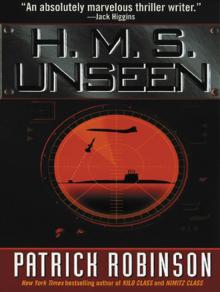 H.M.S. Unseen
H.M.S. Unseen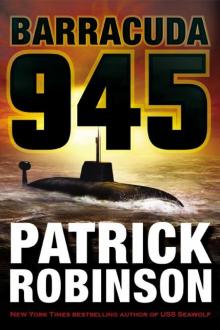 Barracuda 945 (2003)
Barracuda 945 (2003)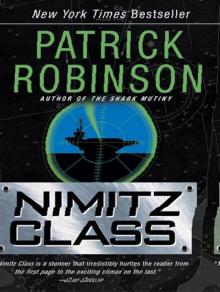 Nimitz Class
Nimitz Class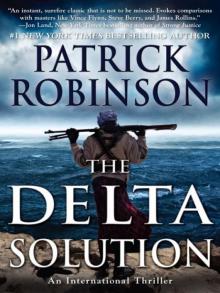 The Delta Solution
The Delta Solution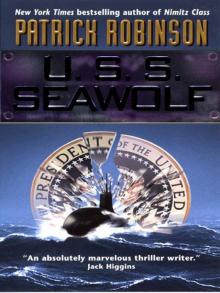 U.S.S. Seawolf
U.S.S. Seawolf